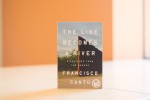The first time I heard about the Common Book, I was two midterms into week six and finishing an eight-page essay.
Suffice it to say, I wanted nothing to do with a novel.
Unfortunately, many students will be introduced to the Common Book this way – a process which often involves promptly forgetting about the book’s existence.
The Common Book Program began in 2008 as an effort to foster community between new students. Each year, a book is selected by a committee comprising mainly UCLA Residential Life and First Year Experience staff and provided to the freshman class to incite discussion and present a common theme for the academic year.
The program chooses narratives likely to spark conversation – books such as “Bad Feminist” and “Between the World and Me” have been selections in previous years – as part of a larger attempt to heighten social awareness and foster discussion that might not occur naturally.
In the past, UCLA gave the Common Book to incoming first-year students the summer before they began classes. Now students can get the book if they opt into the program. Katherine Alvarado, a UCLA spokesperson, said the book is also an optional educational program that faculty and staff can incorporate into curricula.
But between ridiculously low engagement rates, lack of discussion attendance and little to no purposeful consultation with students and faculty, the program’s goals are cut short before it can even begin to reach its full potential.
The Common Book would benefit from more student and faculty involvement in the decision-making process. This book sends a message about which voices the university chooses to elevate and making the selection process more inclusive has the potential not only to engage more students, but also to encourage often difficult conversations about topics such as gender or discrimination that can create an increasingly aware and empathetic student body.
This year, the book selected was “The Line Becomes a River” by Francisco Cantú, which details Cantú’s experiences as a U.S. Border Patrol agent. This choice sparked controversy, as many felt the first Common Book about the Latinx experience should not be the story of someone complicit in U.S. border policies such as deportation or family separation.
A group of faculty members wrote an open letter in response to the choice, arguing Cantú was profiting from his involvement at the border with his speaker fees. Ultimately, he donated his speaker fees to the UCLA Undocumented Students Program, as well as to an undocumented man and his family who are mentioned in the book.
Charlene Villaseñor Black, a professor of art history and Chicana and Chicano studies who was involved in writing the open letter, said she thinks this year’s Common Book selection reflects a lack of input from people familiar with its themes.
“This process would have benefited from there being more Latinx people on the selection committee because they would have pointed out the problems with this,” Villaseñor Black said. “There was not enough representation on the committee, and they also didn’t consult with faculty experts on migration.”
This year’s selection made clear how the Common Book Program neglects its responsibility to uplift narratives that represent the university community in an inclusive and accurate manner.
Sean Metzger, a professor of theater and performance studies who also helped author the open letter, said privileging this year’s selection over other narratives about immigration was a significant choice.
“That’s a big thing for me – what’s the style, what kinds of things are being excluded, what kinds of voices are being validated or not,” Metzger said.
With poorly selected narratives come low engagement rates, so it should come as no surprise that the program consistently falls short in promoting discussion, despite its 10-year matriculation.
Yet the controversy of this year’s book speaks to the potential of the program in guiding campus discussion. Although this year’s Common Book was in poor taste, the ensuing conversation was significant given the current political climate. If the program can harness this potential in a more inclusive and representative manner, it could facilitate the kind of meaningful and diverse discussion incoming Bruins deserve.
Michelle Carter, a second-year geology and biology student and one of two students on the 2018-19 Common Book committee, said student participation in the selection process would improve the selection of and discussions surrounding the book.
Moreover, the Common Book should not stay within the confines of the Hill. Incorporating it into curriculum, consulting with faculty and increasing the selection process’ inclusivity is the only way to meaningfully integrate the program into a larger campus dialogue.
Certainly, the Common Book Program faces a difficult task in picking a single story for a student body with 45,000 narratives. And no matter how exceptional the selection, one book can’t change the course of campus culture. But consulting those who will be represented is a good place to start choosing what story to tell each year. No amount of outreach can ensure everyone reads the text, but heightened involvement in the process is likely conducive to increased interest in the book itself.
UCLA might just be surprised by the results if it opens the doors to the program.
After all, you can’t judge a Common Book by its cover.
